A Ride Through Yokohama
A taxi is an unusual place. A fleeting moment, just you and the driver. A singular encounter interwoven with the scenery and casual conversation. A drive through Yokohama in late summer of 2020.
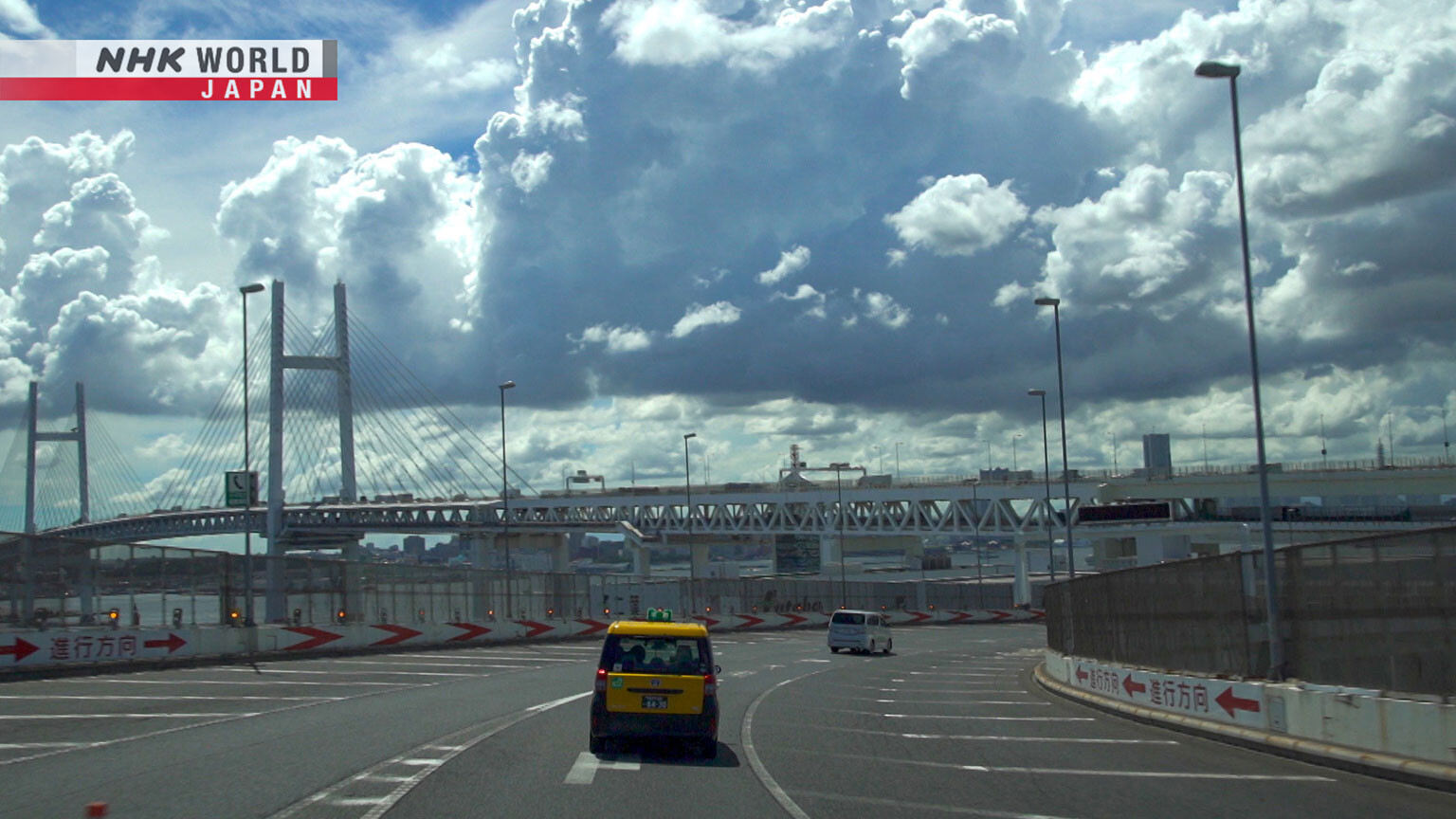
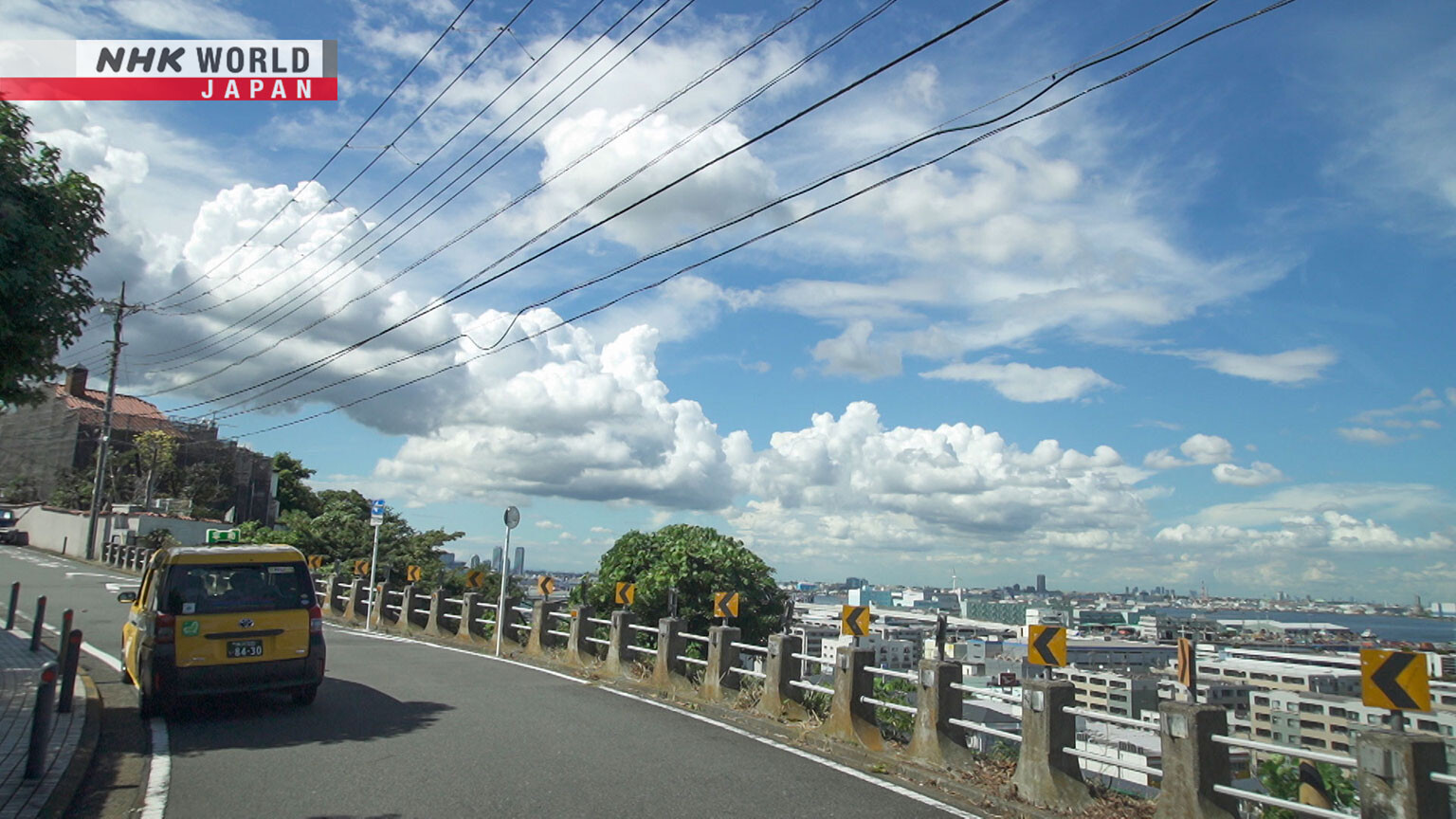
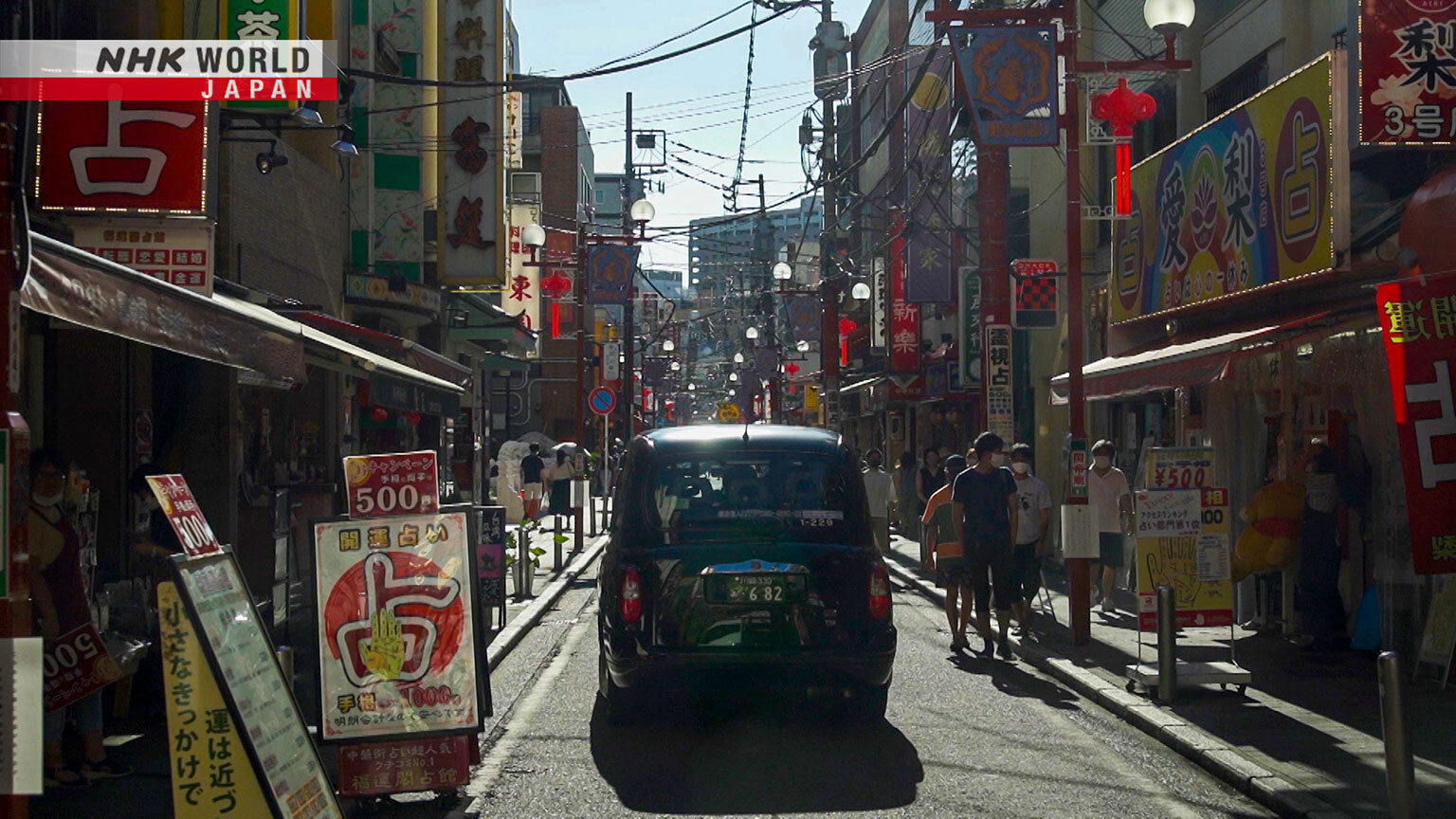
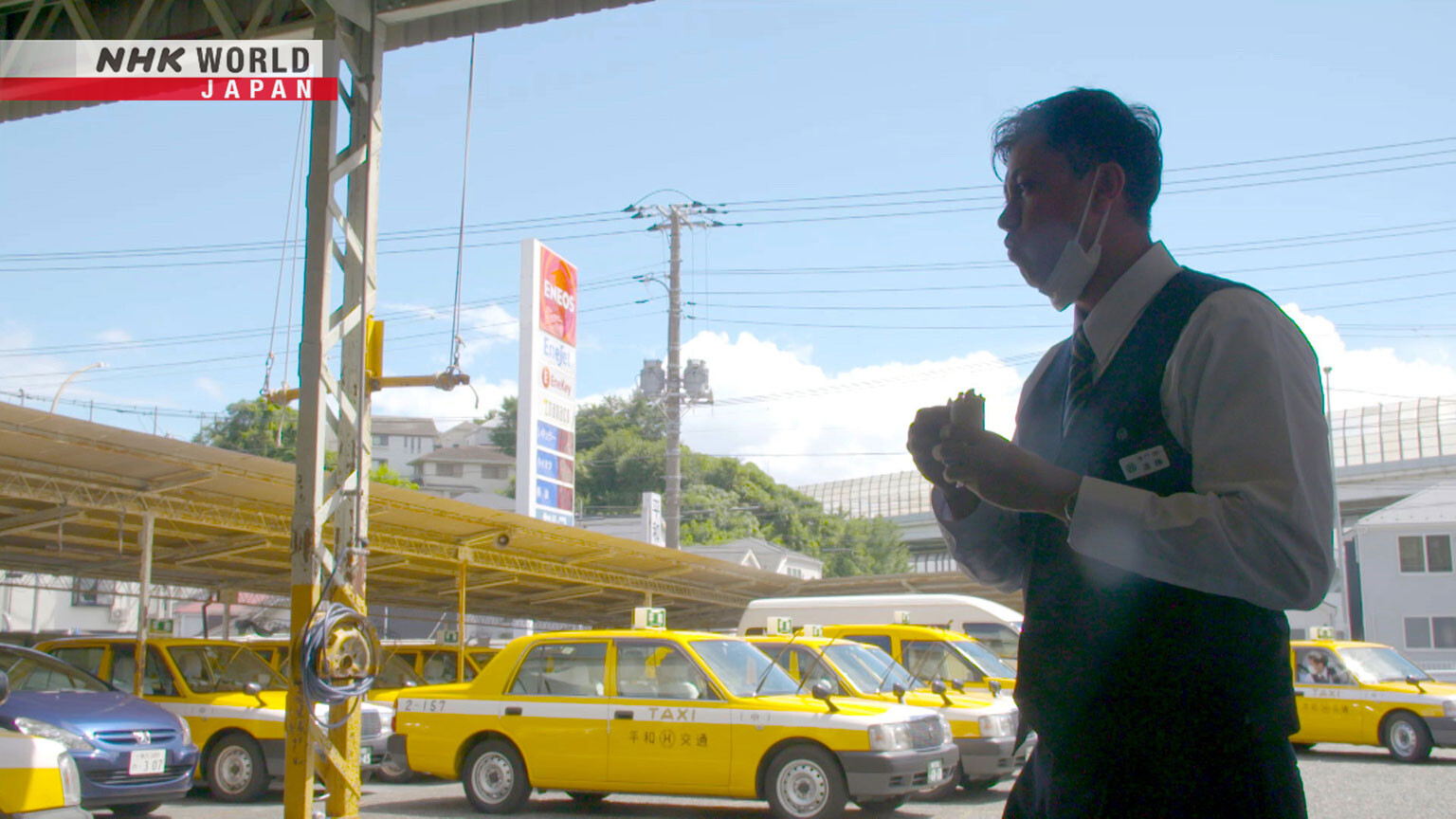
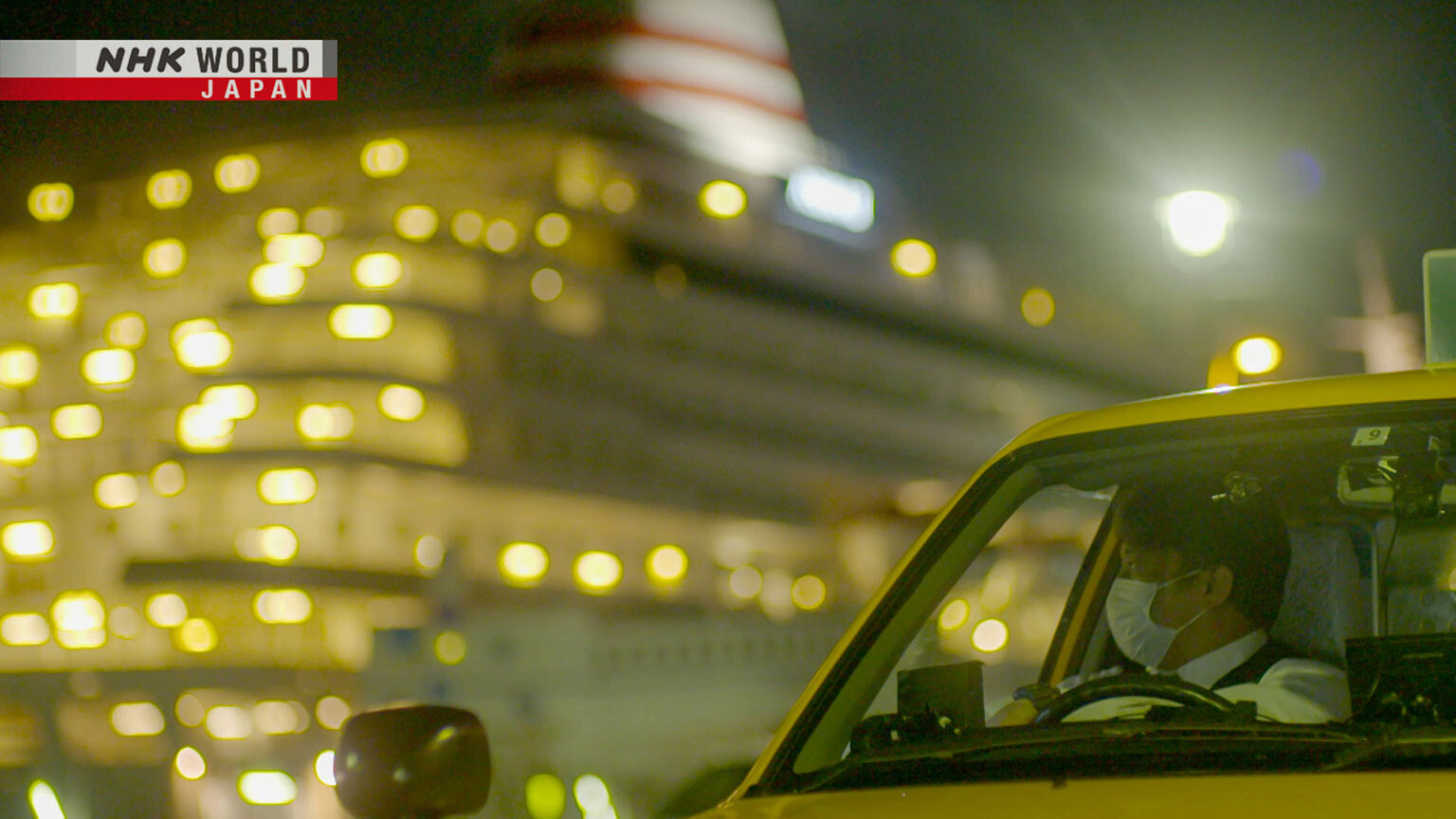
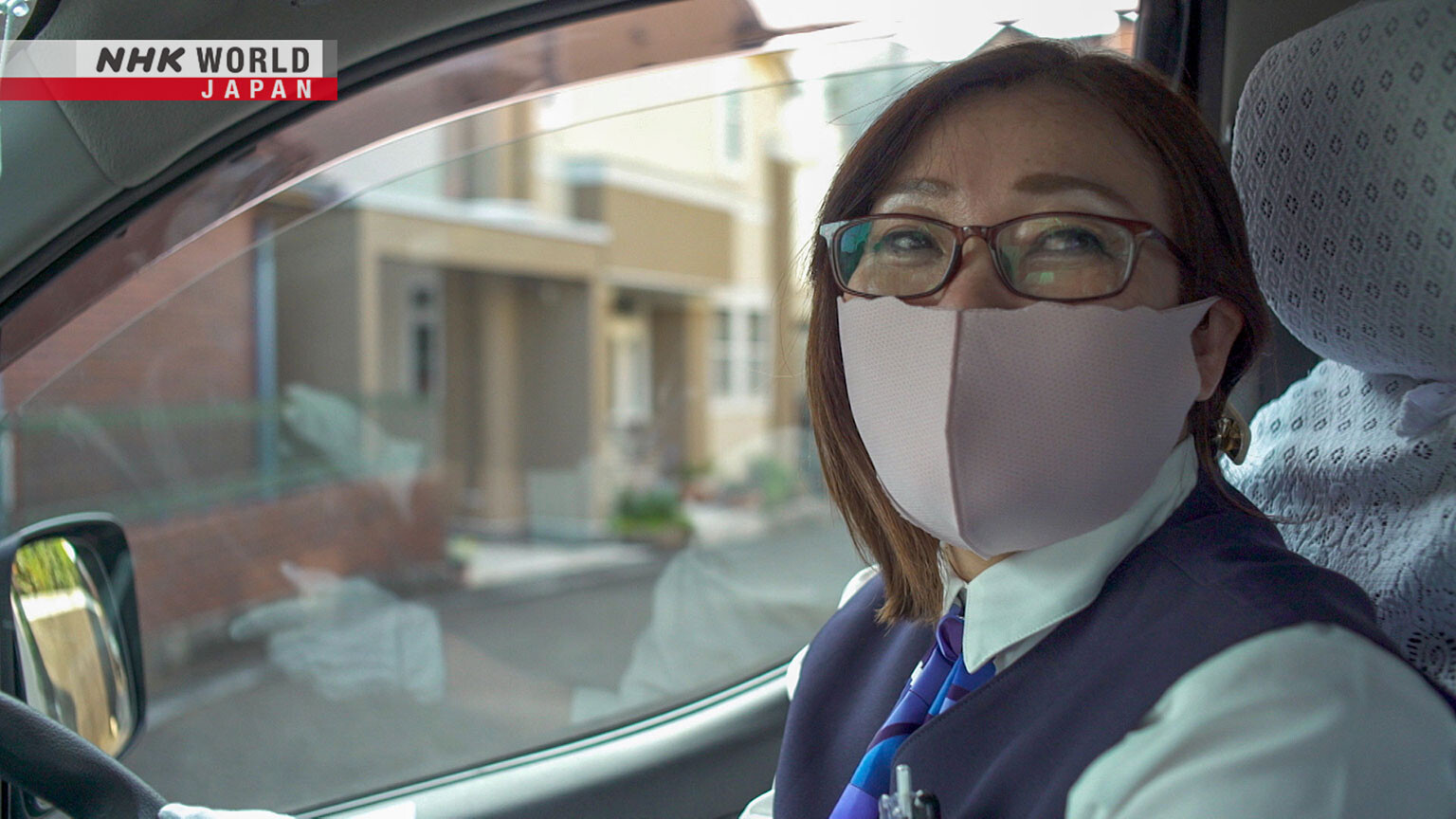
Transcript
We've come to Kanagawa Prefecture, the city of Yokohama.
Our taxi is waiting at the cruise ship terminal.
Hello.
What kind of place is this?
It's a recently completed pier
for large cruise ships.
Passengers can disembark here for
sightseeing in Yokohama.
What's that over there?
Some monument...?
I actually don't know.
Taxis operate in every city in the world.
A fleeting moment, just you and the driver.
If you know the city song you're a local.
I'm not actually from Yokohama.
Our destination, the port city of Yokohama.
In the 160 years since it opened to outside trade,
Yokohama has become a fascinating blend of Japan and the wider world -
a modern city with its eye on the future.
Thinking of all the people who work here
is pretty exciting to me, too.
A taxi driver sees the city and the times.
Be true to yourself and
people will notice.
The taxi drivers we meet lead us on a late-summer journey in this city by the sea...
...as we take a once-in-a-lifetime ride through the city of Yokohama.
Born and raised in Yokohama, our driver, Endo AtomBashi, takes us for a seaside drive.
The International Passenger Terminal
is here to the left.
There's a ship if you'd like to see it.
- It's huge!
- Yeah, really big.
Like the quarantine ship?
Yes, this is where it docked.
I was here that day.
I took some of the passengers.
It feels like everything changed
after that day.
Masking and other measures began then.
Like now I keep the windows open,
ventilation became really important.
If things were normal...
...there'd be all kinds of ships here.
Since I became a taxi driver, I've always
liked picking up cruise ship passengers.
It's a bit sad there're so few.
- This is Chinatown.
- Yes, that's right.
On weekends I'd almost rather avoid it.
There're usually so many pedestrians.
Looking around, it seems like
foot traffic is picking up again.
Do locals often come here to eat?
Personally I don't eat pork,
so I don't come here often.
I do like bubble tea.
I eat here with friends sometimes.
I just make sure to check that
there's no pork in my order.
Endo is a Muslim.
Since it's lunchtime he takes us to one of his favorite local spots.
They're a lunch place,
they do kebabs and such.
Would you like to try it?
It might be even better than
the way they make it in Turkey.
That's how good I think it is.
The owner used to cook there.
He's actually from Turkey.
Here it is.
It really is tasty.
Hello. "As-salaam alaikum."
Are you well?
- You'll be on camera.
- My shop? Just a minute.
Very Istanbul. And it's all halal too.
- Best in Japan.
- Yeah.
Maybe even in Turkey.
None better.
- You can't get this in Turkey.
- That's for sure.
Spicy or sweet?
- Sweet for me.
- Maybe medium-hot?
- Sounds good.
- Okay.
The medium-hot is pretty spicy.
- Here you go.
- Thank you.
- It's my pleasure.
- My pleasure too.
An authentic kebab, right here in Yokohama.
Okay, let's eat.
The sauce has a bit of a kick.
The cabbage and meat are nice and juicy.
Delicious.
Best in Japan. Maybe the world?
Did he pay for yours too?
Yes.
Hospitality is part of Islam.
- It's common?
- Yes, it's only natural.
Guests are always welcomed.
It's written in the Koran.
- Is that so?
- Yes.
I also do it because I want to.
His father is from Pakistan.
After marrying his mother, a Yokohama native, they moved here together, and Endo was born.
He took us to see his favorite view.
The harbor, this view, if you're born here
it's something you take for granted.
But for those not used to it,
it's always a crowd pleaser.
This bridge was finished right around
the time when I was born.
Before, to get to Tokyo you had to go
the long way around and traffic was bad.
Now there are two ways to go.
After the war, the area really changed.
In old pictures it's totally different.
Even the size of the harbor,
there's a lot of reclaimed land.
In fact, I think most of the shoreline
around here is actually artificial.
And in Yokohama new buildings
spring up all the time.
The more people who need them
the more they build.
It'll probably keep on changing.
But I suppose...
Doesn't everyone have a view
that takes them back?
Well, for me, I'm still in my 20s.
I guess there's nothing that
makes me feel so nostalgic.
So, living in this changing town,
maybe I'm part of that change.
And I'm changing too.
In Islam, we say "In shāʾ Allāh."
It means, "If God wills."
Things change, "In shāʾ Allāh."
That's how I feel about it.
The Minatomirai area.
"Minato mirai", "Future harbor", but why?
Maybe 20 or 30 years ago...
I think that's when they came up with
the "Future Harbor 21" plan.
That was in the last century.
To them the 21st century was the future.
That's my guess anyway.
An everchanging townscape.
But where does the future become the past?
On a sunny holiday afternoon we find a London-style cab in the center of town.
How should I put them on?
Like this, I guess?
My trade name, "Nakahara
Yokohama Sightseeing Taxi."
And "Yokohama Sightseeing Concierge."
Last, my local guide certification.
- Certified tour guide?
- Yes, for Yokohama.
First class, rank 1.
- Only two people have it.
- Just two?!
- I think you should wear them all.
- Okay...
- Like this?
- Looks good.
His beloved taxi has a name, he calls it "Charles."
Yokohama sightseeing specialist Nakahara Kazuhiro
takes us on a drive through the heart of the city.
- So, Mr. Nakahara...
- Yes?
Are you a "Hammako" ?
Yes, Yokohama born and raised.
They say if you live here three days,
you're a "Hammako".
But I don't know who said it.
Since way back, Yokohama's had overseas
connections, welcomed all kinds of people.
Maybe that's why. It's common to meet
people from all over the world here.
I grew up with that.
But as for me, If you ask,
"What's my definition of a Yokohama citizen?"
- If you know the city song you're a local.
- The Yokohama song?
"Japan is an Island country
Seas shimmer in the sunrise
To these majestic isles
Come ships from every nation,"
that's how it goes.
In school, we learned it
before the school song.
Back then when I was growing up,
Yokohama's population was exploding.
It went up by 120, 130 thousand a year.
Basically the population of a small city.
That many moved in every year.
There weren't enough schools.
So they built new ones,
and the school songs came later.
So, at a ceremony or a graduation
you'd sing the Yokohama song.
Everybody should be able to sing it.
So, to me if you know the song,
you're a Yokohama citizen.
The scenery has completely changed
since back when I was a kid.
Everything's really been modernized.
When was it, maybe 1989?
The Yokohama Expo was held
at what became Minatomirai.
The Yokohama Expo, held when Japan's economy was at its peak.
"Future Harbor," Minatomirai 21 was created as a development district to become a symbol of Yokohama at its finest.
This former shipyard is now a tourist attraction.
Just imagine what it must've been like...
Only customs officials and dock workers
used to be able to enter.
Maybe up until the late 40s, there were
forklifts running all over the place.
The port is a tourist attraction now,
but it wasn't like that back then.
Trams ran all over Yokohama,
I used to use them a lot.
Buildings were low so you could
see pretty far.
The sky was bigger in the old days.
But now you can't see far at all.
Nakahara watched Yokohama grow, living here as the city changed around him.
As if retracing a childhood memory, he brought us to a special destination.
Beyond this tunnel is Honmoku.
Until around 40 years ago, this was a residential area for US military personnel.
There were white houses and huge lawns;
much bigger than we were used to.
You don't usually see that in Japan.
There was also a really high fence,
and naturally, you couldn't get in.
There were fences all along
both sides of this road.
It was like being in a different world.
Once, when he was little, he followed a streetcar here all the way from the neighboring district on his bicycle.
The tunnel was a gateway to another world.
There were English signs everywhere.
And you could see the camp all around you.
And my favorite tram went through it.
What a view!
This was part of the US camp too.
- Here?
- Yes.
Now, there's a big condo building.
The land was taken back and
this is what it looks like today.
There were soldiers walking all over.
You'd see MP jeeps, military police.
Soldiers in white MP helmets were
always patrolling the area.
All the milk, ice cream, the bread they ate,
even the dry cleaning...
They had their own separate facilities
by Yokohama station.
You wondered why it smelled of bread.
That's what it was like here.
They took the best part of midtown.
Little by little the land was returned,
but this was the last place to go.
I used to ride my bike up and down
all along that fence.
I got so thirsty on hot days.
But as a kid I'd never buy drinks
from a vending machine.
There're usually water fountains,
so I took a ride through the park.
I really enjoyed riding by.
I didn't go for any particular reason,
I just liked to ride my bike around.
I'm not sure why...
I guess I was drawn here.
I wanted to go somewhere unfamiliar.
And this was the environment
I happened to be in.
Which do you think is better
Yokohama now, or back then?
I like them both.
Who's better, my wife now or then?
I guess the most people would think
the one I knew when I was younger.
But I don't care that much.
I love the Yokohama I'm in.
What makes Yokohama, "Yokohama"?
Hmm.
Maybe...?
People who love it.
Not the buildings, or the harbor.
It's enough if the people in Yokohama
love their city.
A city is really just people.
That's what gives it its identity.
Love is what makes a good city.
Now is when traffic gets bad.
- It's pretty crowded.
- Yeah.
Everybody's on the way home.
Early evening, a little way from the sea, we board our next taxi.
This is downtown, a working-class area.
Yes. We're coming into Tsunashima.
There are lots of little bars.
This area used to be a spa town.
Here on the right was all old-style inns.
But that's all gone now.
There even used to be geishas.
The spas all closed and now
they're building a new station.
The station is underground,
but surface lines will stop here.
The Kohoku area where Matsumura drives is a popular Tokyo bedroom suburb.
And he often drives the same customers on a daily basis.
People commuting in the morning or
at noontime, or going to the hospital.
Lunchtime fares often go shopping,
and in the evening they're going home.
Our company is very local.
When the conversation gets good
some customers want to keep talking.
- They ask you to keep driving?
- Yes.
Or they just say, "keep the meter running."
Sometimes I joke that this cab is a prison.
Know what I mean?
Like, "Hey, let me out of here!"
You're not from Yokohama are you?
No, I'm from Chigasaki originally.
Every day at 4 AM, Matsumura commutes to Yokohama.
Apparently, he switched to his current employer because of their sense of humor.
They had a "Turtle Taxi", with a button
that showed a turtle mark when pushed.
Instead of having to ask, you push it
and the driver would slow down
because they could see the turtle.
It told them not to go so fast.
That kind of thinking from a company
is pretty interesting to me.
His previous job was as a photographer.
He first picked up a camera in high school,
and worked photographing weddings and teaching.
Even now, he still exhibits his work once a year.
I was 32 when I got married.
I mostly worked odd jobs till I was 30.
Once I got a real job, I got married.
I was passionate about photography.
Maybe even obsessed.
How should I say it? Be true to yourself
and people will notice.
And even if they don't,
that's how I live anyway.
Do you shoot portraits or landscapes?
I suppose mostly landscapes.
I guess nostalgia is what I'm after.
Is there nostalgia here?
A little, I suppose.
As the drive continues, he shares the local history he's learned from his passengers.
Maybe it was around here?
There on the right...
Oh, yeah! A public bath.
Looks nice. Like the old...
Yeah, like the old days.
I love scenes like this.
None of the roads are straight.
They were all old farm tracks
that got paved over.
Apparently there was a big pond here,
but that was paved over too.
This was all wetlands before.
Here on the right is Yokomizo House.
With the window open you can
hear the insects.
Even in Yokohama you find nostalgia.
What's your image of Yokohama?
To me it's my workplace.
A place where I get the chance to talk
with all kinds of different people.
It's a pretty big workplace.
I don't really ever come here
on my own time.
It would be too weird driving
my own car here.
It's like my brain switches modes.
I'd see someone waiting for a cab.
Or think of a passenger around here
who always goes to a far location.
I can't help thinking about it.
All that information is up here in my mind.
I remember a passenger I pick up here
always goes to this place or that.
Those memories are always with me.
It just pops into my mind as I drive.
The rhythm of daily life in a city suburb.
Another side of Yokohama.
Don't you love the openness here?
Yes, it's great!
You can really feel the freedom.
Are those navy ships over there?
Yes, that's right.
I think the Americans have a dock here.
Really, there's still a US base
in Yokohama?
Well, it has a "Do Not Enter" sign
in English.
So, I guess something's still here.
Do you ever go there?
When I was doing my driver training
they told me about it.
I just saw it once.
Two years ago, Fujisaki left her job as a caregiver to become a taxi driver.
She had been a care worker for 20 years.
When I was a caregiver,
clients would often ask me
to take them for a drive,
and I've always loved driving.
That's why I thought I'd enjoy
driving a taxi.
And I figured if I did that, I wanted
to drive a universal access taxi.
So I applied to this company.
The view here is really nice.
I can understand why so many
people love living here.
Right here, there's a really good view.
Can you see it?
Wow! Amazing!
I always look forward to driving by.
Just that little slice of a view,
it's wonderful, right?
Whenever I really want to relax,
I come up here for a walk.
It just flips a switch, so I can
forget about the bad things.
Lots of people say they love
views like that.
If you saw it from your apartment every day,
it probably wouldn't be such a big deal.
But for people like me who see it
just briefly, it's a real treasure.
The conversation then turns to her younger days.
As a child, I imagined getting married
at 21 and having my first child at 23.
I would always say, "If we get married,
then it better be by then."
- Wow.
- And that's exactly when I got married.
Where did you meet?
- Enoshima Island.
- Really?
- You met there?
- Yes.
It was a popular pickup spot back then.
The boys would just chat you up.
I went there with a friend
who was looking for a boyfriend.
So, we tried to find someone for her.
But I was the one who got picked up.
In Shibuya, Shinjuku, and the like...
they'd always chat you up there too.
But it was just like saying hello.
Boys would always chat you up back then.
Like the way it is in Italy?
Everyone was just really friendly.
Oh.
For me, coming to Yokohama,
the biggest impression that I have
is that there are bridges everywhere.
Like people here are always flying.
If you come on the expressway,
that makes sense.
Oh, really?
If you go along the bayside route
all the way south,
it really is like you're flying.
We "fly" on to our next destination.
I wasn't always the caregiver type.
As a young adult I was rebellious.
And I was pretty bad to my mother.
Isn't that just part of growing up?
But don't some people become
rebellious in their 50s?
- You think so?
- Some do.
So, I think it's okay to be rebellious
once in your life.
Even if it's not till your 50s or even your 80s.
- Now we're up in the sky.
- Very nice.
I'm smiling so much my face hurts.
- Really, that much?
- I really mean it.
To save money, I usually take
the surface route down below.
It's all fenced in, so you don't get
much of a view.
Being up here it's like
you're above the clouds.
The view is so nice, I feel lucky
when people ask to go this way.
Wouldn't it be a little sad if everything
were modernized?
You can still see mountains, trees,
and even the sea in the distance.
That's how Yokohama is now.
I hope it stays that way.
For her, Yokohama is always shining.
Our last driver is a real veteran.
This is Noge Main Street.
It's the main road in the area.
It gets more interesting further in.
There's a real sense of depth.
You get the feeling a lot of the people
who come here come every day.
It seems like somewhere that might
not welcome first-timers.
No, it's not like that.
Oh, really?
This is all just as it's always been.
Strolling around here, going for drinks,
it's a lot of fun.
I couldn't go on my own though.
I'm not from Yokohama.
- What, really?
- I wasn't born here.
I'm from Northeast Japan,
but I've lived here for years.
He left his hometown at 21.
It's now been 25 years.
That's a car freighter over there.
One time a foreign sailor got in my cab,
and he didn't know where his ship was.
That was the most stress I ever had.
He only knew the ship's name.
I asked him which berth,
and he didn't know.
I didn't know what to do.
So, we went all the way to the
Yokohama customs office.
We told the staff the name of the ship
and asked them where it was.
They told me the pier number
and we got him to his ship in the end.
I never imagined I'd pick up a lost sailor.
He's brought us to a favorite spot from his youth.
Wow, so many!
They're basically tuner cars, or racers.
They come to show off their cars.
If you're into hotrods,
then this is the place.
One scene in particular stands out in his memory.
Back in the day there was disco music
blaring out of the speakers.
It's so quiet now.
I came by bike, and climbed the fence.
I was really young then.
It was just regular fencing.
So, I could climb it pretty easily.
I just went up and over.
I had no money back then.
Now I just drive in on the expressway.
In those days he worked inspecting buildings.
I'm happy seeing the industrial complex.
I worked nights when nobody was around.
There were no voices but there
were always clanging noises.
The fun parts were fun, but the hard parts
were really hard. I got pretty dirty.
He tells us about the time he inspected a chimney.
It was 100m up in the air.
Back then I was pretty fearless,
but when I started climbing
the scariest bit was the first 20m.
Once I got above 40 or 50m
I figured that if I fell from there
I wouldn't feel any pain.
So, I wasn't scared.
And up at the top at 100m,
looking down, all the people
and cars were like miniatures.
The wind felt good too.
It's a nice memory.
Do you like the sea?
Yeah, I like it.
What about the sea in Yokohama?
The sea around here?
Well, let me think about it...
It's not very clean.
But how can I say it...?
I feel comfortable here.
It gives me strength.
With all the lights on, it feels like
everyone's doing their best.
People shape the city, and the city shapes the people.
The winds of the outside world blow through this gateway to the sea.
Something about the air is refreshing.
Driving down its streets, the bright city lights reflecting on the water.
Today once again, a taxi through Yokohama.